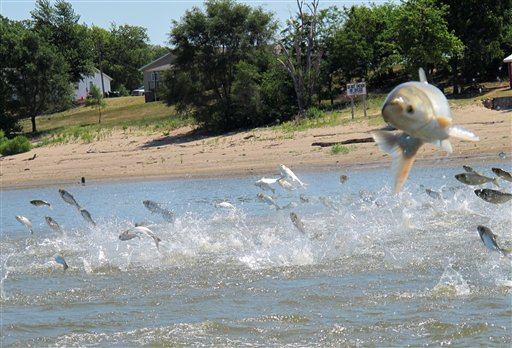EcoMyths: Asian carp’s destructive impact on the ecosystem
By Kate Sackman

EcoMyths: Asian carp’s destructive impact on the ecosystem
By Kate Sackman
Ecosystems are like People
When my life is in balance, I just know it. There’s no formula. What mix creates my personal balance changes over time and likely is not the same as how you find balance. Hopefully, if elements of my life become too demanding, I can adjust and put things back in order. Ecosystems are like that. They’re dynamic, like our own lives. Sometimes deer populations may eat more this year than last — or several young trees die because of drought. But somehow the ecosystem mends itself. It evolves with new plants and animals and finds new balance. The cardinals, the foxes and frogs make their way back to the garden.
But sometimes, balance is improbable because of a great shock to the system. Something essential is added, taken away or both: A prairie becomes an office building drastically changing the landscape; plants that fed deer and provided nesting places for birds vanish. A quote from the World Wildlife Fund website defines ecological balance as “a state of dynamic equilibrium…subject to gradual changes through natural succession.” But sometimes, non-gradual change forces things to a tipping point and the ecosystem cannot adapt.
Lake Michigan Ecosystem: Asian Carp Threaten the Balance
For our monthly EcoMyths segment, Jerome McDonnell wanted to know if the hype surrounding the threat of Asian carp to the Great Lakes ecosystem is warranted. The answer was a resounding “yes!” Fortunately, our experts, Kim Rice of Friends of the Chicago River; and Jared Teutsch of the Alliance for the Great Lakes, have worked hard to prevent Asian carp from reaching the Chicago River and entering Lake Michigan.
The reason: the aquatic food chain in Lake Michigan is already so weakened by other invasive species, like zebra mussel, that adding a voracious plankton feeder such as Asian carp to the mix will likely push it over the tipping point. Meaning? Most fish other than the Asian carp will die. The carp will eat the fish at the bottom of the food chain, leaving very little for other fish to eat. Also, Asian carp reproduce quickly and are exceptionally fast swimmers. In the Great Lakes ecosystem, Asian carp will be the fittest, fastest, and fattest, but they’ll also be lonely because few other fish will survive once the carp move in.
Teutsch, says “It is a myth that we have dealt with other invasive species in Lake Michigan successfully.” Because of the loss of plankton, whose population has been decimated by zebra mussels, the “Lake Michigan ecosystem is at a tipping point already”. Could we bring in a larger predator to eat the Asian carp? If only. Unfortunately, the carp swim too fast and have the advantages I mentioned above. So a big predator fish would more likely eat the slow, easy-to-catch smaller fish rather than the carp. If the Asian carp gets into Lake Michigan and the rest of the Great Lakes, it would likely devastate the $7 billion fishery industry.

Happy Ending?
So will separation happen? As with most projects of this scale, the decision is under consideration and will take time. But let’s hope that it will happen soon. According to a recent report by the Great Lakes Commission, Asian carp have been spotted as close as 5 miles away from Lake Michigan.
You can get involved by tracking the “Asian Carp Prevention Act of 2012” (H.R. 6348). Along with Friends of the Chicago River and Alliance for the Great Lakes, Teutsch recommends joining local groups like Healthy Water Solutions. Learn more about Asian Carp at EcoMyths Alliance.
